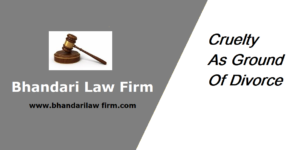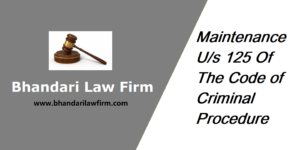Mutual Divorce through Video Conferencing in Chandigarh, Mohali and Panchkula
Mutual Divorce through video conferencing: In present era even courts are adopting e facilities to facilitate the litigants to deliver the justice. Even the Indian Government has initiated the e services with the name of www.ecourt.gov.in
For couple Mutual Divorce is simple way to get separation from each other. It is the best way to dissolve their marriage.
Divorce by Mutual Consent or Mutual Divorce is the term by which couple i.e. husband and wife with their mutual consent mutually agree to end their matrimonial relationship. Both decides that they cannot live together anymore and in that case Mutual Divorce is the best option of the dissolution of their marriage.
Hindu Marriage Act provides the provision for mutual divorce for the Indian Couples. Section 13 B of Hindu Marriage Act provides as under:
13-B. Divorce by mutual consent.-
(1) Subject to the provisions of this Act a petition for dissolution of marriage by a decree of divorce may be presented to the District Court by both the parties to a marriage together, whether such marriage was solemnized before or after the commencement of the Marriage Laws (Amendment) Act, 1976, on the ground that they have been living separately for a period of one year or more, that they have not been able to live together and that they have mutually agreed that the marriage should be dissolved.
(2) On the motion of both the parties made earlier than six months after the date of the presentation of the petition referred to in sub-section (1) and not later than eighteen months after the said date, if the petition is not withdrawn in the mean time, the Court shall, on being satisfied, after hearing the parties and after making such inquiry as it thinks fit, that a marriage has been solemnized and that the averments in the petition are true, pass a decree of divorce declaring the marriage to be dissolved with effect from the date of the decree.
Is there any bar to file mutual divorce?
Yes. There is bar of filing divorce under Hindu Marriage Act. Section 14 of HM Act says that No petition for divorce to be presented within one year of marriage.
How to file mutual divorce?
Ans. Both the parties husband and wife have file jointly divorce petition under section 13B of Hindu Marriage Act by engaging their respective counsels. Best Divorce Lawyers know each formalities to file divorce either Contested or Mutual divorce.
Mutual divorce in India takes how long?
To file mutual divorce the parties must be one married and there must be 6 moths separation between both husband and wife. After filing of mutual divorce generally takes 6 to 7 months to decide the mutual divorce decree.
What is the procedure to get mutual divorce?
Ans. After presenting the divorce petition the parties have to appear before the family court to record their first motion statement. In this statement both have to mentioned that both are filing this present petition without any pressure and with their free will and consent. After recording of first motion statement the court will give next date after 6 months for their 2nd motion statement.
Is there any process to waive off six months waiting period?
Ans. Yes this six months waiting period may waive off by filing waiver application before the concerned court. Note: this is not matter of right it is only discretion of judge, it depends upon facts to facts and separation period of parties. Only best family lawyer may help to get this waiver.
Can Mutual Divorce be filed through power of attorney?
Ans. Yes mutual divorce can be filed through attorney but for the statement of parties have to present before the judge but in some exceptional case statement of parties can be done through video conferencing.
Is any permanent alimony has to pay at the time of mutual divorce?
Ans. No there is any such rules, as it mutual divorce so parties settles their all terms and condition for the mutual divorce.
Can mutual divorce be granted through video conferencing?
Yes. It can be done so recently in case titled Balvinder Singh v. Suman Rani alias Suman Lata, Honorable Double Bench of Punjab & Haryana High Court Chandigarh held that:
Divorce by way of mutual consent – Statement of parties can be recorded through video conferencing. Hindu Marriage Act, 1955 Section 13B Divorce by way of mutual consent – Wife residing in US due to matrimonial differences – Held, statement of both stages of first and second motion can be recorded by resorting to video conferencing in order to ensure that consent given by wife is voluntary and without any undue influence and coercion – Therefore, dismissal of petition for seeking decree of divorce by way of mutual consent on ground of wife not present for recording of statement – Matter remanded back to Family Court.
Facts of the case are the marriage of the appellant with the respondent was solemnized as per Hindu rites and ceremonies on 19.6.1993. They were blessed with three children, namely, Divya Rani (born on 31.1.1998), Vikash Kumar (born in the year 2001) and Kunal Rana (born on 21.6.2009). However, due to matrimonial differences, they started living separately from 15.01.2011. The respondent-wife went to US on 12.10.2014 and residing there since then. Since the issue of incompatibility became severe therefore, they both decided to snap the ties of their marriage by obtaining a decree of divorce by mutual consent and in that process the respondent took an amount of L 3,50,000/- from the appellant towards full and final maintenance and permanent alimony and also decided that Divya Rani would stay with the appellant-husband and both the sons Vikash Kumar and Kunal Rana with the respondent-wife. Ultimately, a petition under Section 13-B of the Act was filed on 1.2.2016 by the respondent through her real sister Ravita Rani, who is a resident of Muzaffarnagar, Uttar Pradesh to whom she had given her special power of attorney for this purpose on 23.11.2015. The said petition has been dismissed by the Family Court, Ambala on the ground that the respondent did not come present in person to record her statement in support of the averments made in the petition and that the verification of the petition was defective. The petition was thus dismissed with liberty to the respondent to file a fresh petition subject to just exceptions of law as and when she come to India and get her statement recorded in person before the Court.
2. Aggrieved by the order dated 2.2.2016, the present appeal has been filed by the husband, who had earlier filed CR No.4891 of 2016 but the same was withdrawn on 5.12.2016 to file the present appeal.
3. Learned counsel for the appellant has submitted that the appeal was filed after a delay of 285 days for which he had filed CM No.26409-CII of 2016 in which notice was issued on 23.12.2016.
4. Learned counsel appearing on behalf of the respondent has not objected to the reasons assigned in the application for condonation of delay, therefore, the said application is hereby allowed.
5. Learned counsel for the appellant has further submitted that the matter has already been settled between the parties and he had already paid L 3,50,000/- to the respondent towards full and final settlement and the parties have already decided about the custody of their children but the petition filed by them has been dismissed only on the ground that the respondent did not come present for recording her statement at the first motion stage in support of the petition filed by her along with the appellant rather the statement is sought to be recorded on her behalf by her sister who is holding her special power of attorney. It is further submitted that the learned Court below has erred in dismissing the petition on the ground that the verification is defective because it is not pointed out as to what was the defect in the verification.
6. Learned counsel for the appellant has further argued that the statement of the respondent can be recorded by resorting to the medium of video conferencing and defect in the verification, if any, can be cured. In this regard, he has relied upon a decision of this Court rendered in FAO-M-328-2018 titled as “Jasmine Kaur v. Supinder Singh” decided on 5.12.2018 in which wife had gone to New Zealand on study visa and the husband was in India. She was unable to come to India but her petition was dismissed on the ground that the statement of the special power of attorney cannot be recognized. In the said case, while referring to a decision of the Supreme Court rendered in the case of “Amardeep Singh v. Harveen Kaur” 2017 (4) RCR (Civil) 608, this Court had taken a decision that the statement of both the stages of first and second motion can be recorded by resorting to video conferencing in order to ensure that the consent given by the respondent is voluntary and without any undue influence and coercion. The arrangement was made by the Court that the person making the statement would be identified by her mother (special power of attorney holder) and her advocate.
7. Learned counsel for the respondent has also supported the case of the appellant.
8. Thus keeping in view the aforesaid facts and circumstances, we are of the considered opinion that the order dated 02.02.2016 deserves to be set aside and the matter deserves to be remanded back to the learned Family Court for reconsideration of the petition filed by both the appellant and the respondent for the purpose of grant of decree of divorce under Section 13-B of the Act.
9. Consequently, the present petition is hereby allowed and the impugned order dated 02.02.2016 is set aside. The matter is remanded back to the learned Family Court, Ambala to allow the respondent to record her statement at the first motion stage by way of video conferencing which shall be recorded by the learned Presiding Officer and at that time the respondent shall be identified by her sister Ravita Rani, whom she had given her special power of attorney, and also by her advocate. Insofar as the issue of error in the verification of the petition is concerned, the learned trial Court has not made it clear about the error in it but in any case, the learned Court below would grant an opportunity to the appellant and respondent to file an amended petition with the correct verification.
10. With these observations, the present appeal is hereby allowed and the parties are directed to appear before the learned Family Court, Ambala on 6.3.2019.
In last the permission of Mutual Divorce through video conferencing was allowed.
Note: For any further information or any query you may contact us on 9855677966 or via email info@bhandarilawfirm.com



